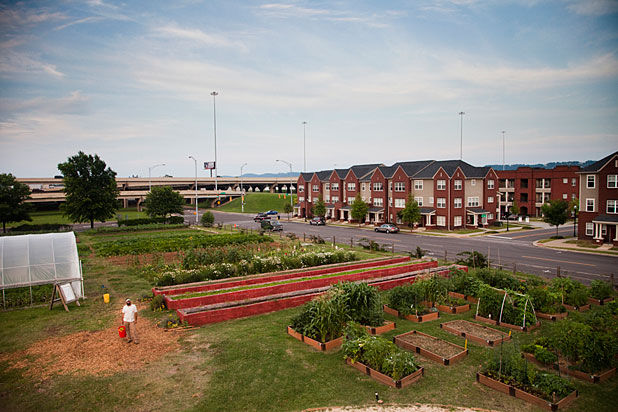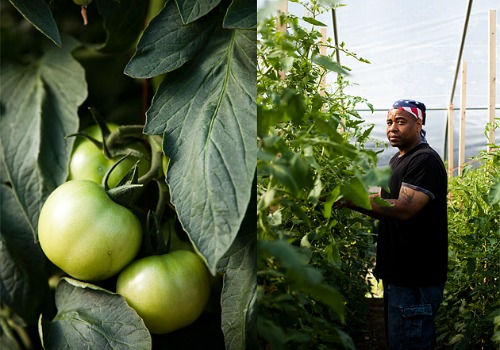January 2011 update: Many of the photos have been removed from this series so they can be published in a Breaking Through Concrete book, forthcoming this year from UC Press.
In fall 2001, Edwin Marty and Page Allison drove across the country, back home, to start a farm. That might be when the Breaking Through Concrete idea began.
Edwin and Page had been living on the West Coast, farming in Baja, Mexico, and instructing youth at Washington’s Pacific Crest Outward Bound School. The young 30-somethings belonged on the West Coast, surfing and teaching among the burgeoning, youthful tribe of educated, worldly organic farmers. But Birmingham needed them more than any of the progressive, farm-friendly towns out west.
Jones Valley Urban Farm began on a skinny vacant lot in Birmingham’s Southside neighborhood. Abandoned houses surrounded the weed-and-rubble-strewn plot. A corner convenience store across the street sold everything but wholesome food. The afternoon ice-cream truck supplied the freshest food for miles. That is to say, this food desert was not much different than most neighborhoods in downtown Birmingham and much of Southside. But, just up the street, Frank Stitt’s James Beard Award–winning restaurants were catching the first wave of the national Slow Food movement and tapping into the regional bounty of the Deep South, from Apalachicola Bay oysters to Black Belt, Alabama, produce. And every Saturday in the summer, the Pepper Place Market, about 20 blocks away, sold produce and fruit from Alabama farms to a growing consumer pool.
Now JVUF, a non-profit, sells over $100,000 a year in produce and flowers. It grows fresh food for 50 CSA members, 37 community garden-plotters, 28 local restaurants, and provides farm and food programming to 5,000 youth and adults.
By the time I met Edwin in 2004, when we both worked as editors for Time Inc. magazines based in Birmingham, JVUF was a thriving production farm with a growing sphere of influence. The original Southside plot remained the hub, with two other farms under way. I’d drop my compost off at the Southside farm in mornings. Edwin sold the produce at the farmers market and to the restaurants of Stitt, Chris Hastings, and an increasing number of others.
It was more than just food production. Though Edwin and Page went their separate ways, a farm team was building in the form of a board of directors, volunteers, and interns. Edwin drew on his education background and hired Rachel Reinhart as part-time program director (she’s now full-time). They expanded outreach to the YWCA, the Alabama School of Fine Arts, the YMCA, and other Birmingham youth projects with farm training, farm-to-plate programs, internships, and summer camps.
We had impromptu parties at the Southside plot, as well as farm-formal Sunday Suppers shared around a 60-foot-long train of folding tables resting atop mulch and covered in white tablecloths. Bowls and platters were full of salads and casseroles and baked dishes of ingredients pulled straight from the surrounding rows. The dinners raised awareness about food connections and the concept of “knowing your farmer, knowing your food” as much as they raised money for JVUF.
In 2006, JVUF went under a sea of sunflowers. Thanks to the James Rushton One Foundation, a 3.5-acre city block on 7th Ave North and 25th St. became available for Edwin and the crew. The sunflowers, a cover crop for the poor city soils, bloomed that summer, their yellow brilliance in the largely abandoned and lethargic downtown cityscape an obvious metaphor for JVUF’s impending impact via this Gardens of Park Place Farm.
Four years later, Edwin and JVUF have become the face of fresh food in Birmingham. The crowds at JVUF Sunday Suppers and gatherings have grown from the loyal “low-hanging fruit” of the early days to people and communities who, 10 years ago, would have laughed at the idea of a farm in downtown Birmingham. Now JVUF, a non-profit, sells over $100,000 a year in produce and flowers. It grows fresh food for 50 CSA members, 37 community garden-plotters, 28 local restaurants, and provides farm and food programming to 5,000 youth and adults. JVUF manages a new 25-acre farm at the residential development, Mt. Laurel, and the growing is contagious — the West End Urban Garden project opened recently, inspired and instructed in many ways by Edwin and Jones Valley.
The Gardens of Park Place farm (top photo) is the calmest spot in downtown Birmingham. We hang out on the deck of the headquarters. Weddings happen here, including that of Edwin to his wife Andrea. People still gather at long tables to eat off the land. We jump in the cistern when it’s full of roof-collected rainwater. Perhaps most importantly, this homecoming idea that originated on a Baja farm, now supports a crop of young Birmingham farmers who are eager and skillfully equipped to follow in Edwin and Page’s footsteps and dig into their hometown.
All material ©Breaking Through Concrete. For questions regarding use of images, video and/or, text, please contact btctour@mail.com.



